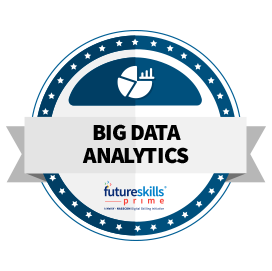Course Provider

What will you learn in Big Data Analytics course?
Get introduced to popular big data systems and platforms, as well as tools like Mapreduce, Spark etc. Learn with industry-use cases and understand the fundamentals of big data processing systems, analytics & visualizations.
In this 55-hour long course, with 9 tools, 3 projects and 32 assignments, you will evaluate trends and understand the features of databases. It will take you through platforms, processing, management and analytics. By the end of this course, learners will develop a thorough understanding of how Big Data Analytics works and how it is transforming businesses.
You will be skilled to write map, reduce codes for distributed processing of data and gain practical skills needed for modelling big data projects. Differentiate between a traditional database management system and a big data management system, select appropriate data models, retrieve data and execute simple big data integration and processing operations.
Big Data Foundation
-
 Skill Type
Emerging Tech
Skill Type
Emerging Tech -
 Domain
Big Data Analytics
Domain
Big Data Analytics -
 Course Category
Foundation course
Course Category
Foundation course -
 Certificate Earned Joint Co-Branded Participation Certificate
Certificate Earned Joint Co-Branded Participation Certificate -
 Nasscom assessment Available
Nasscom assessment Available -
 Course Covered under GoI Incentive
Yes
Course Covered under GoI Incentive
Yes -
-
 Course Price
INR 5,000+ 18% GST
Course Price
INR 5,000+ 18% GST -
 Course Duration
50 Hours
Course Duration
50 Hours
-
Why you should take Big Data Analytics course?
The course will establish an understanding of Big Data Analytics, visualization and data. With more than 50% of the course comprising of practical on some popular platforms like Hadoop and Apache, learners will understand the nuances while acquiring hands-on skills. On completing this course, you will earn a Big Data Analytics certification co-branded by Digital Vidya and nasscom FutureSkills that is recognised by the industry as a credible micro-credential.
Depending on your current skills, you can explore tracks for data engineering or application engineering. Leverage the course to grow within your organization or switch your profile.
In 2011, McKinsey & Company had analyzed the industry demand-supply mismatch for people with deep analytical skills and hypothesized that by 2018, there will be a shortage of 1.5 million data experts. This course will help upskill for the most in-demand industry skill to transform your future with a career trajectory in Big Data Analytics.
Who should take Big Data Analytics course?
Data enthusiasts must take up this course. STEM students enrolled in the University, passionate about engineering, computer science, statistics, science or mathematics will find this big data course to be valuable for navigating their chosen academic field.
Graduates entering the workforce who are exploring career options or mid-level working professionals looking to upskill and enhance their employability must take up this course to understand the core concepts and practical application of Big Data Analytics.
Professionals who already have a background in Oracle, SAP, DB2, MySQL, Data Engineering and Database Expertise, can grow as a Big Data- Data Engineer/ ETL Engineer. If you have a background as a J2EE/ Java Developer, Python Developer or other full-stack developer, you can explore the Application Engineer Track.
Curriculum for Big Data Analytics Course
The Big Data Analytics course is further split into 3 modules for a structured approach and a pedagogy that mixes theoretical concepts with practical assignments.
Module 1: Introduction to Big Data Analytics
Starting with an overview of the basic knowledge required before being trained on the core concepts of Big Data Analytics. Starting with the six Vs: Volume, Variety, Velocity, Veracity, Valence and Volume, the course moves on to introduce data science. Big Data use cases will explain how the technology is used in cases such as fraud prevention, security intelligence, prize optimization, recommendation engines, preventive maintenance and operational efficiency. The foundation of systems and programming covers distributed File Systems, scalable computing, cloud computing and cloud service models. Learners will get hands-on practice with the use-cases of Big Data in 5 different industries.
Module 2: Big data Fundamentals & Platforms
In this module, learners will develop foundations in data structure and algorithms, get exposure to different platforms used for processing big data, such as Hadoop and learn to implement appropriate data structures to solve big data problems. Learners will also run introductory big data tasks: run map and reduce codes, perform data storage and retrieval operations as well as batch processing operations on big data platforms. By the end of this module, you would have an idea of tools including, Java, Hadoop, Apache Pig, Apache Spark & Dynamo DB.
Module 3: Big Data Processing, Management and Analytics
Split into 3 topics, this module deep dives into the conceptual knowledge of data ingestion, storage operations, rational and semi-structured data models, fundamentals of big data integration, pipelines, analytical operations as well as visualizations using big data. Learners will learn how to combine data of different types, such as static distributed dataset, streaming data, SQL or NoSQL storage etc. drawn from different sources, and build a predictive model.
Tools you will learn in for Big Data Analytics course
- Java
- Hadoop
- Apache Pig
- Apache Spark & Dynamo DB
- Postgres
- Pandas and MongoDB
What to Expect from the FutureSkills Prime Big Data Analytics Course :
Big Data Analytics by FutureSkills Prime offers a future-ready pathway for individuals seeking to excel in the world of data. This comprehensive course equips learners with the skills and knowledge required to harness the potential of big data. Through hands-on training and real-world projects, students master cutting-edge tools and techniques such as Hadoop, Spark, and data visualization. With expert guidance and industry-aligned curriculum, graduates are prepared to address real-world challenges and unlock valuable insights from massive datasets.
Earning a career data analytics certification is a wise investment in today's data-driven world. With businesses relying heavily on data to make informed decisions, certified data analysts are in high demand. A data analytics certification validates your expertise in analyzing and interpreting data, making you a valuable asset to employers across various industries. Whether you're a beginner looking to enter the field or a seasoned professional seeking career advancement, a data analytics certification demonstrates your commitment to excellence and enhances your employability.
The Big Data Analytics course offers numerous advantages for aspiring professionals and organizations alike. By enrolling in this course, individuals gain the expertise to efficiently process and analyze vast volumes of data, uncovering valuable insights that drive better decision-making. They learn to use cutting-edge tools and techniques like Hadoop, Spark, and data visualization, enhancing their employability in a data-driven market.
With a Big Data Analytics certification course, you can unlock a wide range of lucrative job opportunities in the data-driven job market. Graduates can pursue roles such as Data Analyst, Business Intelligence Analyst, Data Scientist, Data Engineer, Database Administrator, and Machine Learning Engineer. These professionals are in high demand across industries like finance, healthcare, e-commerce, marketing, and more, as businesses seek to extract valuable insights from large datasets.
FAQs
Working professionals with a background in handling and managing data must upskill with this course. For roles including, database administrator, database analyst, ETL (Extract, Load and Transform) Engineer, data analyst, SQL expert, etc, this course could be a starting point to navigate the world of Big Data. STEM graduates too must upskill themselves to understand the foundational basics.
Understand the application and scope of technology and gain a competitive advantage. This government-certified industry-handpicked course will enable you to cross-skill quickly and become a broad-skilled Big Data Technologist.
In terms of specialization, you will have the basic skillset for transforming your trajectory as a:
Data Engineer: if you prefer data modeling, SQL query, etc.
Application Engineer: if you prefer programming, coding, and hackathons
Yes, if this is your area of interest, you can! The course requires a sound understanding of Statistics and Maths and with additional self-study, you will be able to complete the course.
No prior experience in Big Data or programming is required to join this course. It is designed for beginners and individuals with limited exposure to Big Data concepts. Basic computer skills and familiarity with data analysis will be helpful but not mandatory.
The course covers essential topics such as Big Data concepts, data storage and processing, Hadoop ecosystem, data modeling, data ingestion, data analysis, and data visualization. It provides a comprehensive understanding of the core principles and technologies used in Big Data analytics.
The Big Data Foundation course includes practical hands-on projects that allow learners to apply their knowledge and skills to real-world scenarios. These projects involve data processing, analysis, and visualization using popular Big Data tools and technologies.
Yes, upon successful completion of the course and projects, you will receive a certification from the course provider. This certification validates your proficiency in Big Data analytics and is a valuable addition to your resume, enhancing your career prospects in the field.
The course is designed to be self-paced, giving learners the flexibility to access lectures and course materials at their own convenience. While there are no fixed schedules, it is recommended to follow a structured approach to make the most out of the learning experience and complete the course within a reasonable timeframe.
Big Data Foundation welcomes beginners! No prior experience in Big Data or programming is needed. This course is designed for those new to the field, including data enthusiasts and career changers, and can be a valuable foundation for STEM students.
The course is designed to be self-paced, giving learners the flexibility to access lectures and course materials at their own convenience. There are no fixed schedules, but to make the most of the content and complete the course within a reasonable timeframe, a structured approach is recommended. This 55-hour course packs in a lot, with 9 tools explored, 3 projects to solidify your learnings, and 32 assignments to test your comprehension of database features and trends.




